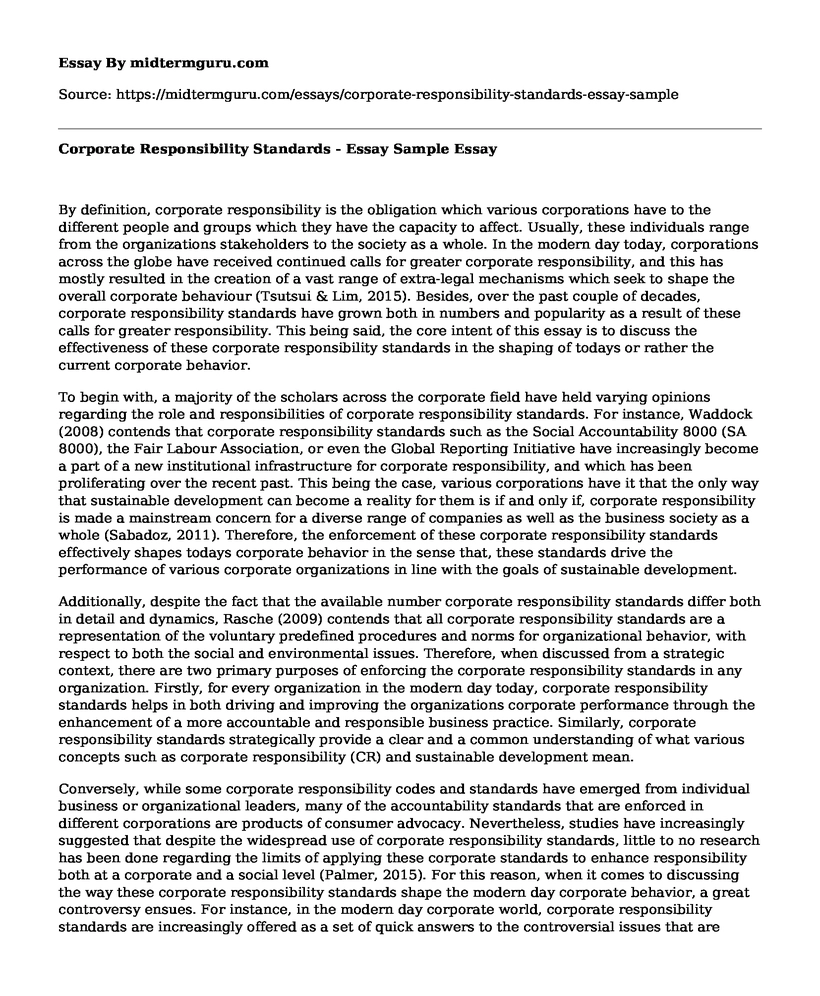By definition, corporate responsibility is the obligation which various corporations have to the different people and groups which they have the capacity to affect. Usually, these individuals range from the organizations stakeholders to the society as a whole. In the modern day today, corporations across the globe have received continued calls for greater corporate responsibility, and this has mostly resulted in the creation of a vast range of extra-legal mechanisms which seek to shape the overall corporate behaviour (Tsutsui & Lim, 2015). Besides, over the past couple of decades, corporate responsibility standards have grown both in numbers and popularity as a result of these calls for greater responsibility. This being said, the core intent of this essay is to discuss the effectiveness of these corporate responsibility standards in the shaping of todays or rather the current corporate behavior.
To begin with, a majority of the scholars across the corporate field have held varying opinions regarding the role and responsibilities of corporate responsibility standards. For instance, Waddock (2008) contends that corporate responsibility standards such as the Social Accountability 8000 (SA 8000), the Fair Labour Association, or even the Global Reporting Initiative have increasingly become a part of a new institutional infrastructure for corporate responsibility, and which has been proliferating over the recent past. This being the case, various corporations have it that the only way that sustainable development can become a reality for them is if and only if, corporate responsibility is made a mainstream concern for a diverse range of companies as well as the business society as a whole (Sabadoz, 2011). Therefore, the enforcement of these corporate responsibility standards effectively shapes todays corporate behavior in the sense that, these standards drive the performance of various corporate organizations in line with the goals of sustainable development.
Additionally, despite the fact that the available number corporate responsibility standards differ both in detail and dynamics, Rasche (2009) contends that all corporate responsibility standards are a representation of the voluntary predefined procedures and norms for organizational behavior, with respect to both the social and environmental issues. Therefore, when discussed from a strategic context, there are two primary purposes of enforcing the corporate responsibility standards in any organization. Firstly, for every organization in the modern day today, corporate responsibility standards helps in both driving and improving the organizations corporate performance through the enhancement of a more accountable and responsible business practice. Similarly, corporate responsibility standards strategically provide a clear and a common understanding of what various concepts such as corporate responsibility (CR) and sustainable development mean.
Conversely, while some corporate responsibility codes and standards have emerged from individual business or organizational leaders, many of the accountability standards that are enforced in different corporations are products of consumer advocacy. Nevertheless, studies have increasingly suggested that despite the widespread use of corporate responsibility standards, little to no research has been done regarding the limits of applying these corporate standards to enhance responsibility both at a corporate and a social level (Palmer, 2015). For this reason, when it comes to discussing the way these corporate responsibility standards shape the modern day corporate behavior, a great controversy ensues. For instance, in the modern day corporate world, corporate responsibility standards are increasingly offered as a set of quick answers to the controversial issues that are faced by businesses at a corporate level. This, in essence, is done instead of using these responsibility standards as a way of grasping the numerous insolvable internal contradictions that underlie the general notion of corporate responsibility as a whole.
References
Palmer, D. E. (2015). Handbook of Research on Business Ethics and Corporate: Responsibilities. Hershey, PA: Idea Group,U.S.
Rasche, A. (2009). Toward a model to compare and analyze accountability standards - the case of the UN Global Compact. Corporate Social Responsibility and Environmental Management, 16(4), 192-205. doi:10.1002/csr.202
Sabadoz, C. (2011). Between Profit-Seeking and Prosociality: Corporate Social Responsibility as Derridean Supplement. Journal of Business Ethics, 104(1), 77-91. doi:10.1007/s10551-011-0890-1
Tsutsui, K., & Lim, A. (2015). Corporate social responsibility in a globalizing world. Cambridge, United Kingdom: Cambridge University Press is part of the University of Cambridge.
Waddock, S. A. (2008). The difference makers: How social and institutional entrepreneurs created the corporate responsibility movement. Sheffield, UK: Greenleaf Pub. Ltd.
Cite this page
Corporate Responsibility Standards - Essay Sample. (2021, Jul 05). Retrieved from https://midtermguru.com/essays/corporate-responsibility-standards-essay-sample
If you are the original author of this essay and no longer wish to have it published on the midtermguru.com website, please click below to request its removal:
- Annotated Bibliography on Strategic Management Cases
- Setting New Priorities: Organizations Restructuring - Essay Example
- Research Paper on Supply And Demand for Global Air Transportation
- Paper Example on Strategy in Action: Rolls Royce
- Essay Sample on Ethical Leadership of Modern-Day Tool Kit
- Empowering Managers to Create Teamwork and Goodwill in an Organization - Essay Sample
- Managing Change in Health Care: Assessing, Planning, and Executing Strategies - Essay Sample







